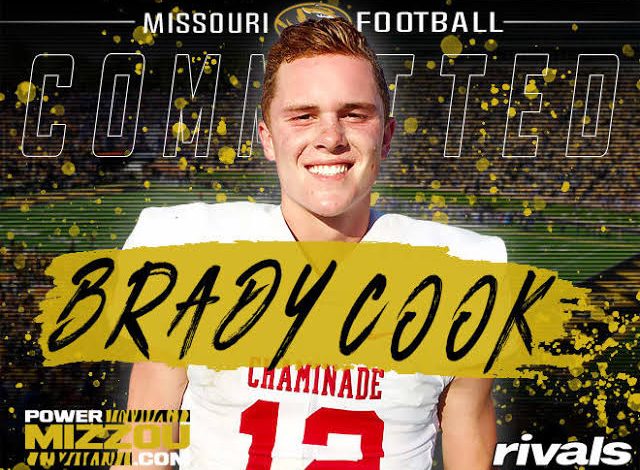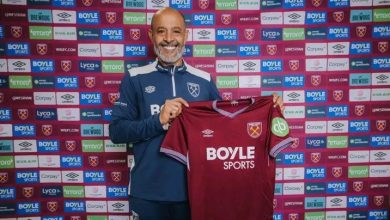Brady Cook Turns Down $4.5 Million NIL Deal from Alabama to Stay Loyal to Missouri – A Monumental Decision in College Football…………….

Brady Cook Turns Down $4.5 Million NIL Deal from Alabama to Stay Loyal to Missouri – A Monumental Decision in College Football…………….
In one of the most talked-about decisions of the year, Brady Cook, the quarterback for the Missouri Tigers, has defied expectations and made an extraordinary choice that has shocked the college football world. Turning down a mind-blowing $4.5 million NIL (Name, Image, and Likeness) offer from the Alabama Crimson Tide, Cook has chosen to stay with Missouri, prioritizing loyalty and integrity over the allure of financial windfalls. This bold move has not only sent shockwaves through the college football community but has also set a new precedent for what it means to be a student-athlete in the modern age.
A Massive Offer on the Table
In today’s college football landscape, NIL deals have become a powerful tool for both recruiting and retaining top talent. The opportunity to profit off one’s name, image, and likeness has led to a dramatic shift in how players make decisions about their future. Alabama, one of the premier programs in college football, saw Brady Cook as a key piece in their future and was willing to back that up with an eye-popping $4.5 million offer.
For any player, especially one still in college, a $4.5 million NIL deal is a life-changing sum—one that would guarantee financial security for years to come. However, Cook’s decision to turn down such an incredible financial opportunity speaks volumes about the character that has defined his journey thus far.
While many athletes in similar positions would be quick to jump at such a staggering offer, Cook chose a path that many would consider more unconventional in today’s climate: he turned it down in favor of his loyalty to Missouri, where he has developed not just as a player but as a leader. In a landscape where so much of college sports seems focused on money, Cook’s decision to stay with his current program instead of chasing the brightest financial future speaks to something much more profound.
Loyalty Over Financial Gain
Brady Cook’s decision to remain at Missouri isn’t just about the dollars and cents—it’s about what he values. Cook has expressed his unwavering commitment to the Tigers, a program that has supported him throughout his career. In a statement released shortly after the news of the offer surfaced, Cook made it clear that his choice was driven by his passion for the team, his teammates, and the culture he has helped build at Missouri.
“It’s never been about the money for me,” Cook said. “What I’ve experienced at Missouri, the relationships I’ve formed, and the opportunities we’ve had as a team are what matter most to me. This is where I started, and this is where I want to finish. We’ve got something special here, and I want to be part of that.”
This commitment to his team and his school is a rare quality in the modern age of college football. With the increasing influence of NIL deals, players are more often seen as commodities, their decisions influenced by financial incentives and the desire to play for the most prestigious programs. Cook, however, is making a statement that goes against the grain—proving that loyalty, integrity, and team commitment can still outweigh any financial offer, no matter how substantial.
The True Value of Loyalty in College Sports
In a time when the college sports system is being scrutinized for its emphasis on financial deals and transfers, Brady Cook’s loyalty offers a refreshing change. His decision brings attention back to the true essence of college athletics—teamwork, dedication, and the pursuit of something greater than just personal gain. Cook’s story serves as a reminder that success in college sports isn’t only about collecting trophies or earning millions, but about the relationships built and the legacy left behind.
Cook’s refusal to leave Missouri for a more financially rewarding opportunity also challenges the current trend of athletes transferring to bigger schools for a shot at national championships or to benefit from more lucrative NIL offers. Every season, we see star players leaving their current teams for programs with bigger rosters and larger financial packages. Cook’s decision is a clear repudiation of that culture, as he opts instead to finish what he started with the Tigers and leave his own lasting mark on the program.
This move is significant not just for Missouri but for college football as a whole. Cook’s loyalty speaks to a more traditional, values-driven approach to sports that seems increasingly rare in an age dominated by the business of athletics. In many ways, Cook has become a symbol of what college football used to be—an arena where athletes played for the love of the game, the pride of their school, and the bonds forged with their teammates.
Impact on Missouri Football
For Missouri, Cook’s decision is nothing short of monumental. As the Tigers look to continue building a competitive program in the highly competitive SEC, retaining a player like Cook is crucial. Not only is he one of the team’s most talented players, but he also serves as a leader on and off the field. His presence will continue to provide stability and direction for the Tigers in their pursuit of SEC and national success.
Cook’s loyalty gives Missouri a clear advantage as they look to attract future recruits who value culture, development, and long-term relationships over immediate financial incentives. The quarterback’s decision may signal a shift in how college programs approach recruitment moving forward, emphasizing the importance of building strong connections with athletes and offering them an environment where they feel supported and valued.
The Broader Implications for College Athletics
Brady Cook’s decision also has broader implications for the future of college athletics. With the increasing role of NIL deals, there is growing concern that financial incentives will overshadow the traditional college sports experience. Cook’s refusal to accept the massive offer from Alabama is a defiant stance against the commercialization of college football, signaling that there are still players who view college sports as more than just a stepping stone to professional success.
This move could also serve as a wake-up call to other college programs, urging them to reassess their approach to player development and retention. While financial incentives will always be a part of the college sports landscape, Cook’s decision highlights the importance of creating an environment where athletes feel a genuine connection to the team and its mission.
Moreover, Cook’s decision might inspire future generations of players to consider factors beyond financial rewards when making decisions about their athletic careers. It’s a powerful reminder that sports are about more than just money—they’re about passion, loyalty, and the impact athletes can have on their communities.
Conclusion: A Defining Moment in College Football
Brady Cook’s decision to turn down Alabama’s $4.5 million NIL offer to remain loyal to the Missouri Tigers is one of the most defining moments in college football in recent years. In an era where financial deals and transfer portals dominate the headlines, Cook’s choice is a rare and powerful example of loyalty, commitment, and the enduring values of college athletics.
His decision isn’t just about staying at Missouri for another season; it’s about staying true to what matters most—his teammates, his coaches, and the fans who have supported him from the beginning. Cook has shown that, even in today’s highly commercialized world of college sports, there’s still room for loyalty and passion to take precedence over the pursuit of financial gain.
For Missouri, Cook’s decision is a game-changer, one that will resonate for years to come. For college football, it’s a wake-up call that loyalty, integrity, and tradition still have a place in the modern era. And for Brady Cook, it’s a moment that defines his legacy—not just as a player, but as a leader and a symbol of what college sports should be all about.





